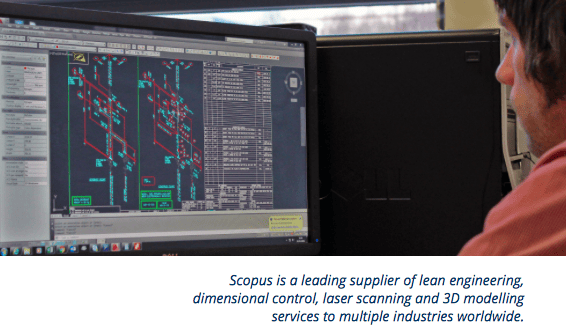
In 2015 Scopus began working on a large modular build of surface facilities for a Middle Eastern customer. The scale of the project was significant; incorporating more than 170 structures being fabricated in 8 locations worldwide, the development of man-made islands, and support facilities for more than 2,000 people. We caught up with Neil Brady, Scopus Managing Director, to find out more about the project, and Scopus’ role.

Neil, what can you tell us about the overall project?
It is one of the largest oilfields in the world, with almost 100 existing platforms. The premise of the multibillion dollar project is to increase the field’s production capacity by 50%.
The first phase of the project focused on the creation of the offshore facilities; which included subsea pipelines, and fibre-optic cables as well as the installation of tens of thousands of tonnes of offshore structures. The second phase was the construction of facilities on artificial islands containing a central complex which will comprise the processing facilities and satellite facilities.
What was Scopus’ role in this project?
Initially we provided the verification of primary civil foundations in line with project drawings for the individual islands. For the modular build, we are applying our Dimensional Control techniques to ensure that the components of the new infrastructure are fabricated within specified tolerances. The components are fabricated in parallel across multiple locations worldwide and are then brought to site to fit seamlessly together.
Put simply, our role is to reduce the cost and duration of a project, helping the customer to start the new plant up sooner. Our process, combined with our experience and proprietary software enable us to effectively cut time off the construction schedule through the maximisation of pre-fabrication and minimisation of hot work on site.
So what is Dimensional Control and how is it being used on the project?
Dimensional control is effectively a way to capture as-built data via a series of surveys with millimetre accuracy. These surveys are used to determine critical interfaces and tie-in points to ensure that newly fabricated items fit when they arrive at site.
Fabricated items are hardly ever built to the exact design dimensions which introduces risk into a project. This can result in large cost premium for additional engineering, construction man-hours, and additional steel assemblies. We work closely with EPC (engineer, procure, construct) contractors and fabricators to deliver optimal design solutions for fabrication and construction. Combined with Dimensional Control this allows multiple fabrication facilitates to be utilised in parallel. The key area of saving is the indirect costs associated with longer build schedules; such as equipment hire, projects teams, and delayed start-up. For every hour we can cut off the schedule, the customer saves massively, particularly within a lump-sum environment.
Generally speaking the bigger the project, the more value Scopus can add, as we carefully and significantly shave construction times and engineering man-hours along with a host of other benefits. We are currently delivering these benefits to other projects in the oil and gas industry as well as other sectors including petrochemical, nuclear and defence sectors.
How complex were the units being fitting together?
Pre-assembled units (PAUs) contain process equipment, steel structure, pipework, instrumentation, electrical and telecommunication items and potentially other equipment such as vessels, heat exchangers, filters, and pumps.
The strategy for this project was to build PAUs, as well as pre-assembled pipe racks (PARs) and modules in offsite fabrication yards around the world including Oman, Abu Dhabi, Italy, Dubai, China, South Korea and Singapore. These were then shipped to site and the pipework interconnecting the PAUs, PARs and modules was then joined together using our single-weld philosophy providing a clash-free first-time-fit.
Tell us more about development of the single-weld philosophy?
We knew that there was a requirement for a single-weld philosophy on this project, and this was almost unheard of for this size of project. The development was faced with a number of challenges, some of which included; PARs being fabricated simultaneously in various parts of the world; varying ambient temperatures to be managed and accounted for across the eight yards; and the lack of weld gap specification. These issues had the potential to introduce risk into the philosophy and the project, but we mitigated these from the outset.
We used the facilities at our in-house Training Academy to system test mock–ups and prove survey methods that delivered the results needed. As part of this process we identified and actioned additional code to our proprietary mathematical survey software. It took approximately six months of development and testing before we submitted our proposal, with a fully developed survey methodology and supporting procedures.
You must be pleased with the progress on the project to date?
We knew that the development of a single-weld philosophy will be challenging, but Scopus is at the forefront of technology, and we knew that we could do it. We’re delighted that our input is proving so valuable to our customer, and very proud that our work on this project has set a benchmark for our industry.

For more information on this project, contact BD Manager, Robert Hamilton.
T: +44 (0) 1224 278641
E: [email protected]
















